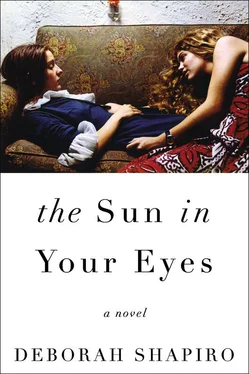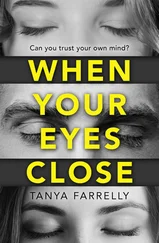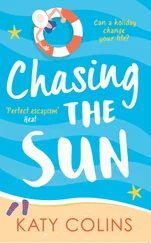“Both, I think.”
The more recent events of Lee’s love life, or the photographic record of what looked like events, hadn’t escaped me during the time that we’d been out of touch. Lee’s level of celebrity didn’t make her a target of tabloid gossip, but from time to time she would appear in the coverage of a party or a premiere, be snapped by a street photographer. I asked her if it was true that she’d been “linked” again to Jack Caprico, the actor who had managed to remain relevant and frequently cast twenty years after his breakout role as a Gen-Xer who read Beat poetry during his downtime on the McJob. She had been seeing him before, and brought him to my wedding, but I’d heard they’d broken up. Rather, I’d read they’d broken up.
“Yes, we were linked,” she said. “Like breakfast sausage.”
“Sounds hot.”
“It was always pretty hot with him. That was never the problem.”
“So what happened?”
“We’re friends now. Friends who don’t talk much or see each other. But you know. I got kind of depressed when we were together this last time, and he said it reminded him of his mother and his sister and he couldn’t deal.”
I expected her to change the subject, turn it to me, but she continued, as though a vein had been opened. Depression may not have been the clinical term for it, but she’d been low. She got herself to work, but the rest of the time she was too low to do little more than watch TV or lie in bed thinking about how much effort it would take to do anything but lie in bed. Low in a way that felt like a habit or an addiction; her lowness made her want more unstructured and unaccountable time in which to be low. Social engagements — any kind of engagement —encroached on that time and were therefore a source of resentment. The lowness was like an addiction, too, in that she was compelled to hide it. She would keep the remote in her hand, ready to turn off the TV as soon as she heard Jack’s key in the front door. She would quickly get out of bed. “What are you doing?” he would ask. “Oh, just tidying up.” Along the depression spectrum, there must be a point at which one is no longer able to be furtive, when you’re too depressed to care about appearances. She hadn’t reached that point. But how many times can you center a pile of books on a night table? Stand over your coffee table looking slightly lost? Was paranoia part of it too? Jack could, if it occurred to him, determine whether the TV was warm and just-watched. He could detect the recent impression of her body on the quilt and sheets, the indent in the pillow. Even the TV and the bed — her greatest comforts — were against her. She reached what she thought was a nadir at the supermarket when she found herself crying in the aisle to a soft-rock standard. She began to worry that she was disappearing, that she’d never really been there at all. ( Me too! I half wanted to interject. Can we run off and read Emily Dickinson poems to each other for the rest of our days? ) She woke once from a dream in which she could fly, and Jack said flying in dreams was good. Freedom, power. She said she was inside a big house, and she was flying from room to room. Well, more like floating. Floating speedily. So nobody would see her. Like a ghost, Jack said. How obvious. How sad. But what she didn’t tell him, what she couldn’t tell him, is that she had loved her ghostly advantages. Moving around undetected, the superiority of it, being slightly above everyone.
“These kind of dreams, they were pretty much the only color in my life. Anyway, it was Linda who finally made me see a therapist.”
“What does your therapist think of all this? What we’re doing.”
“I haven’t talked to her about it. Which is something I should talk to her about. She’s great, really. It’s, um, therapeutic to talk to her. But sometimes things will happen and I’ll think, Viv’s the person I want to talk to about that.”
She was often still the one I wanted to talk to, not simply out of habit, but because if she were listening, if she knew about it, whatever it was would be more interesting, more significant. I wavered between believing she felt the same way — how could she not? — and sensing that I was deceiving myself. If she’d really wanted or needed to talk to me, she would have. But it couldn’t be that simple, I thought. Our relationship wasn’t that simple. No, she must have wanted to talk to me but couldn’t bring herself to do so precisely because it wasn’t that simple and she trusted me to understand that. Unless our relationship really was that simple for her? She had left me with a mystery I tried to solve with circuitous thinking. It was a way to keep her present. It pleased me no end to hear her confirm now that I hadn’t merely invented the complexity between us and that I wasn’t the only one still holding on to it.
“I know.”
“I know I’m the one who stopped returning your phone calls. It became hard for me to talk to you. But it was also hard not to talk to you.”
“I know what you mean.”
“You do?”
Say it. Tell her.
“Lee, I’m pregnant.”
“What?”
“You’re the first person I’ve told.”
“What — oh. Oh my god. That’s — that’s wonderful!” she said, her pause giving the lie to her words, as though I had been there a minute ago and was now lost to a world of architecturally significant strollers and bamboo-fiber baby carriers. Lee had once told me that she worried she was never as excited as she was supposed to be when friends told her this news. To mask insensitivity, she said, and perhaps that lonely, quiet panic that the world is leaving you and your aging reproductive system behind, you learn to ask certain questions. How far along are you?! How are you feeling?! Legitimate questions, sincere ones even, but what did it mean if she asked them of me, now? “It’s wonderful. I mean, it’s good, right?”
“Yes, it’s good. Andy and I were planning this. We’re on the same page. When did I start saying things like we’re on the same page ?”
“I know. You hear yourself saying stuff and it’s just — I used to think you could divide the world into things that were cool and things that you held in contempt. But as you get older, there’s this other category of things that you value just because they’re comforting and easy.”
“Like when you find yourself watching a commercial for chocolate — take a break and treat yourself right! — and you think yeah, I do need to take a break and treat myself.”
“Right. Women and chocolate. In the eighties it was all ‘Chocolate is like an orgasm!’ Now it’s like chocolate is a respite. Going to the spa without leaving your kitchen. It’s ‘you time.’ Which I guess means women used to want sexual satisfaction and now they just want a minute alone.”
“What was chocolate in the nineties?”
“Good question.” She thought about it. “How far along are you? How are you feeling?”
“About a month.”
“And I’m the only person who knows?”
“I haven’t even been to the doctor. I mean, I called them and they said to come in a couple weeks, that if the home test confirmed it, that’s a yes. I already have to pee all the time. But I haven’t told Andy.”
“I thought you were on the same page.”
“We are. In general. As far as pages go.”
“Are you thinking you don’t—”
“I don’t know why I haven’t told him. It’s like I’m scared it will make it real. Even though it already is real. But it’s not like I don’t want it to be real. I do.”
A flicker, a darkening across Lee’s eyes, led me to think she was on the verge of telling me something before she switched modes.
Читать дальше












